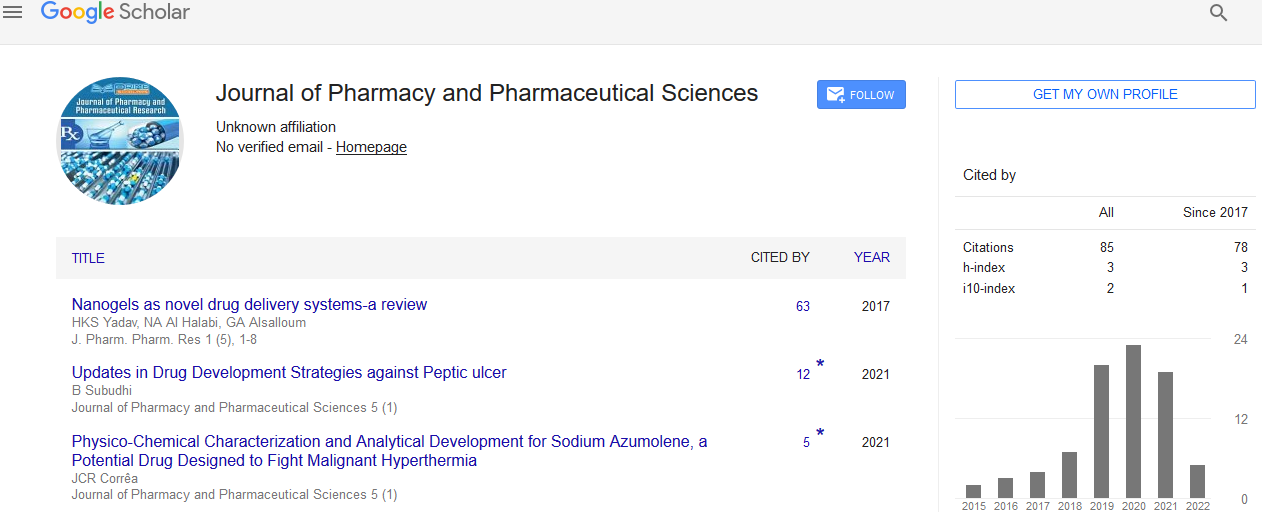Opinion - (2024) Volume 8, Issue 1
Unlocking the Potential: Enteric-Coated Gelatin Capsules
Engy Hudz*
Department of Pharmaceutics, University of Melbourne, Australia
*Correspondence:
Engy Hudz,
Department of Pharmaceutics, University of Melbourne,
Australia,
Email:
Received: 28-Feb-2024, Manuscript No. IPIPR-24-19905;
Editor assigned: 01-Mar-2024, Pre QC No. IPIPR-24-19905 (PQ);
Reviewed: 15-Mar-2024, QC No. IPIPR-24-19905;
Revised: 20-Mar-2024, Manuscript No. IPIPR-24-19905 (R);
Published:
27-Mar-2024, DOI: 10.21767/ipipr.8.01.003
Introduction
In the realm of pharmaceuticals, innovation continually seeks
to enhance the efficacy and convenience of drug delivery
systems. Enteric-coated gelatin capsules stand as a testament
to such advancements, revolutionizing the landscape of
medication administration. These capsules, encapsulating
active pharmaceutical ingredients, are designed to withstand
the harsh acidic environment of the stomach, thereby ensuring
targeted release and absorption in the intestines. This article
delves into the intricacies of enteric-coated gelatin capsules,
exploring their benefits, applications, and the science behind
their functionality. Enteric-coated gelatin capsules serve a
crucial purpose in pharmaceutical formulation by providing a
protective barrier for sensitive APIs. Unlike traditional capsules,
enteric-coated variants are designed to bypass dissolution in
the stomach, where acidic conditions may degrade certain
drugs or cause irritation to the gastrointestinal tract.
Description
The key component of these capsules is the enteric coating,
a polymer layer that remains intact in acidic environments
but dissolves rapidly in the alkaline conditions of the small
intestine. This mechanism facilitates targeted drug release at
the desired site of absorption, optimizing therapeutic outcomes
and minimizing adverse effects. The efficacy of enteric-coated
gelatin capsules hinges on the selection of appropriate
polymers and the precision of coating application. These
polymers exhibit pH-dependent solubility, remaining insoluble
in acidic environments while rapidly dissolving in alkaline
conditions. This pH-sensitive behavior is essential for ensuring
that the enteric coating remains intact during gastric transit but
dissolves promptly upon reaching the higher pH environment
of the small intestine. The process of enteric coating involves
multiple stages, including pre-coating preparation, coating
application, and curing. During pre-coating, the gelatin
capsules are typically subjected to a sealing process to prevent
moisture ingress, followed by the application of a subcoating
layer to enhance adhesion. Subsequently, the enteric coating
solution, containing the selected polymer and plasticizer, is
applied to the capsules using specialized equipment such
as fluidized bed coaters or pan coaters. The coated capsules
undergo curing to ensure uniformity and durability of the
enteric coating, thereby guaranteeing optimal performance
during gastrointestinal transit. Enteric-coated gelatin capsules
offer a myriad of benefits that contribute to their widespread
use in pharmaceuticals: The enteric coating provides
protection against degradation by gastric acid, preserving
the stability and potency of sensitive APIs. By bypassing the
stomach, enteric-coated capsules mitigate the risk of gastric
irritation and ulceration associated with certain medications.
Targeted release in the intestines enhances drug absorption,
leading to improved bioavailability and therapeutic efficacy.
Enteric-coated capsules can be tailored to deliver drugs over an
extended period, allowing for sustained release formulations
that optimize dosing intervals and patient compliance. These
capsules find applications across various therapeutic areas,
including gastroenterology, rheumatology, and pulmonology.
Conclusion
Advances in polymer science and coating techniques hold
the promise of overcoming existing challenges and unlocking
new possibilities for enteric-coated gelatin capsules in
pharmaceutical innovation. Enteric-coated gelatin capsules
represent a remarkable advancement in drug delivery, offering
a solution to the challenges posed by gastric degradation and
gastrointestinal irritation. Through meticulous formulation and
precise coating techniques, these capsules ensure targeted
release and enhanced bioavailability of medications, thereby
optimizing therapeutic outcomes and patient adherence. As
pharmaceutical science continues to evolve, enteric-coated
gelatin capsules stand at the forefront of innovation, poised to
shape the future of medication delivery and improve the lives
of patients worldwide.
Citation: Hudz E (2024) Unlocking the Potential: Enteric-coated Gelatin Capsules. J Pharm Pharm Res. 8:003
Copyright: 2024 Hudz E. This is an open-access article distributed under the terms of the Creative Commons Attribution Li�cense, which permits unrestricted use, distribution, and reproduction in any medium, provided the original author and source
are credited.

